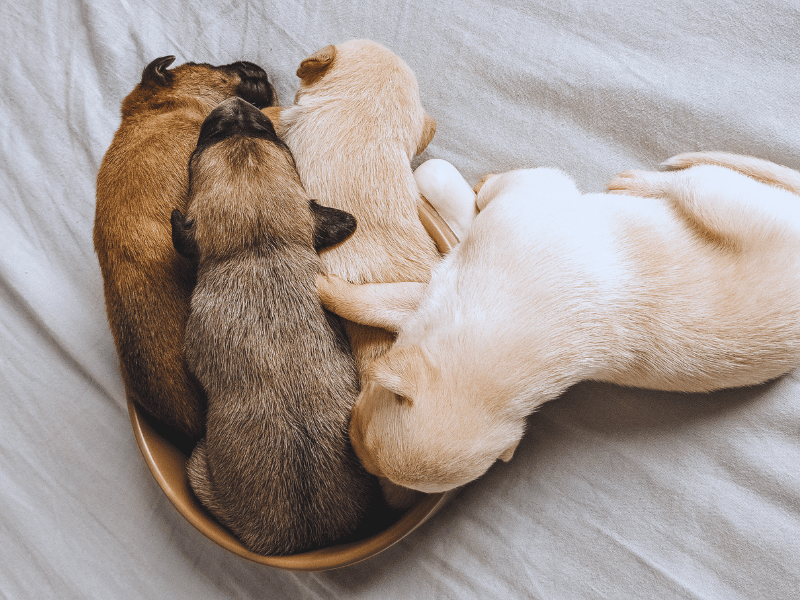Welcoming a litter of puppies into your home is both exciting and challenging. As these tiny furballs adjust to the world, their bond with their mother plays a crucial role in their emotional and physical development. A common question many dog owners face is whether it’s okay to separate puppies from their mother at night. While it might seem like a way to establish routines or manage household disruptions, this decision isn’t as straightforward as it seems.
The connection between a mother dog and her puppies isn’t just heartwarming—it’s vital for their growth. Premature separation can lead to stress, health issues, and behavioral problems for both the puppies and the mother. Before making any decisions, it’s important to understand the developmental needs of puppies and the potential consequences of interrupting their early bonding phase. In this article, we’ll explore whether nighttime separation is suitable and how to handle the process responsibly.
Let’s dive into why this bond matters, the risks of premature separation, and how to make informed choices about managing nighttime puppy care.
Understanding the Mother-Puppy Bond

The bond between a mother dog and her puppies is more than a biological connection—it is the foundation for their survival, growth, and emotional stability. Let’s break down the key aspects of this critical relationship:
1. Warmth and Protection
- Newborn puppies are unable to regulate their body temperature effectively.
- The mother provides constant warmth, keeping them safe from cold temperatures, which can be life-threatening at this stage.
- Her presence ensures the puppies feel secure and protected.
2. Nutrition and Immunity
- The mother’s milk is the primary source of nutrition for puppies in the first few weeks.
- It contains colostrum, which is rich in antibodies and strengthens the puppies’ immune systems, protecting them from diseases.
3. Emotional Development
- Being close to their mother helps puppies develop a sense of security and attachment.
- Early nurturing reduces stress and anxiety, laying the groundwork for healthy emotional responses later in life.
4. Learning Social Behavior
- Puppies learn vital social skills by observing their mother.
- They pick up cues on communication, pack hierarchy, and acceptable behaviors, which prepare them for interaction with other dogs and humans.
5. Reduced Stress for the Mother
- The mother’s bond with her puppies isn’t one-sided. Staying close to her litter ensures her maternal instincts are satisfied.
- Premature separation can lead to anxiety and distress for the mother, negatively impacting her health and behavior.
6. Gradual Independence Building
- The bond naturally evolves as the puppies grow. Around 6–8 weeks, the mother begins to wean them, encouraging independence.
- This natural process allows puppies to transition smoothly into the next stage of life without trauma.
Why Owners Consider Night Separation

Separating puppies from their mother at night is a topic of debate among pet owners and breeders. Some owners may consider this practice for various reasons, but it’s essential to evaluate the potential impacts on both the puppies and the mother before making such a decision. Here are some common reasons why owners may think about night separation and the considerations involved:
Reasons for Night Separation:
- Sleep Training:
Owners may separate puppies at night to help them become independent and adjust to sleeping on their own, especially if they will eventually live separately from their mother. - Weaning Process:
Night separation can sometimes be part of the weaning process, encouraging puppies to eat solid food rather than rely solely on the mother’s milk. - Preventing Overdependence:
To reduce overattachment, some owners believe brief periods of separation help puppies develop resilience and adaptability. - Health and Rest for the Mother:
In large litters, night separation can give the mother a chance to rest and recuperate without the constant demands of nursing. - Behavioral Adjustment:
Early separation is sometimes seen as a way to manage excessive whining or dependency behaviors, especially if the puppies need to integrate into new homes.
Concerns and Considerations:
- Emotional Well-being:
Puppies separated too early or for long durations may experience stress and anxiety, leading to behavioral issues later in life. - Age Matters:
Puppies younger than 8 weeks are heavily dependent on their mother for nourishment, warmth, and social learning. Night separation at this stage can disrupt their development. - Bonding Time:
The early weeks are crucial for bonding, not just with the mother but also with siblings. Separation can hinder socialization skills. - Proper Environment:
If separation is necessary, ensure the puppies are kept in a warm, secure, and comforting environment to reduce stress.
Potential Risks of Early Separation

Separating puppies from their mother too early can have significant and lasting impacts on their physical, emotional, and social development. While there may be specific circumstances that necessitate early separation, it is crucial to understand the potential risks involved. Here are some key concerns:
1. Emotional and Behavioral Issues
- Anxiety and Stress:
Puppies separated too soon often experience heightened anxiety and may display signs of stress, such as whining, barking, or restlessness. - Fearfulness:
Without the comfort and security of their mother, puppies may grow up to be overly fearful or shy in new situations. - Aggression:
Improper socialization during critical developmental periods can lead to aggressive behavior, as they miss learning boundaries and bite inhibition from their mother and littermates.
2. Poor Social Skills
- Lack of Socialization:
Puppies learn essential skills like play behavior, communication, and proper interaction from their siblings. Early separation can hinder their ability to interact with other dogs effectively. - Difficulty with Training:
Dogs separated early may struggle with obedience and social cues, making training more challenging.
3. Health Problems
- Weakened Immune System:
Puppies receive antibodies from their mother’s milk, which helps strengthen their immune system. Early separation can deprive them of these vital nutrients, making them more susceptible to illnesses. - Nutritional Deficiency:
Transitioning to solid food too soon can cause digestive issues or malnourishment if not done correctly.
4. Developmental Delays
- Inadequate Learning:
Puppies learn critical life skills like grooming, hunting instincts, and pack behavior from their mother. Without this guidance, they may face developmental delays. - Inability to Cope:
Puppies separated early often struggle with independence and may exhibit dependency issues later in life.
5. Emotional Impact on the Mother
- Distress and Anxiety:
The mother dog may experience stress and anxiety if her puppies are removed too soon, disrupting her natural maternal cycle. - Behavioral Changes:
Early separation can lead to depression or aggressive behaviors in the mother dog.
Appropriate Age for Separation
Timeline of Puppy Development
Puppies undergo rapid changes in their first few weeks. Key milestones include:
- 0–2 weeks: Reliant on the mother for warmth and nourishment.
- 3–5 weeks: Begin exploring and learning social cues.
- 6–8 weeks: Start transitioning to solid food but still benefit from their mother’s presence.
Recommended Age for Separation
The recommended age for separating puppies from their mother is between 8 to 12 weeks. By this time, they have completed essential developmental milestones, including weaning onto solid food and learning social skills from their mother and littermates. Puppies separated before 8 weeks risk emotional stress, poor socialization, and weakened immunity, as they miss crucial maternal care and guidance. Waiting until 8–12 weeks ensures they are physically stronger, emotionally stable, and better equipped to adapt to new environments. This timing fosters healthier, well-adjusted puppies while giving the mother adequate time to care for her litter naturally and without distress.
The Consequences of Premature Separation
Separating puppies from their mother and littermates too early can lead to a range of negative outcomes affecting their physical, emotional, and social development. Here are the primary consequences:
1. Behavioral Issues
- Increased Anxiety and Stress:
Puppies may develop separation anxiety, excessive whining, or destructive behaviors due to the lack of maternal comfort. - Aggression or Fearfulness:
Without learning boundaries and bite inhibition from their mother and siblings, they may display aggression or become overly timid. - Difficulty Socializing:
Early separation can hinder their ability to interact properly with other dogs and humans, making socialization later in life challenging.
2. Health Problems
- Weakened Immune System:
Puppies miss out on essential antibodies from their mother’s milk, making them more vulnerable to infections. - Nutritional Issues:
Transitioning to solid food prematurely can cause malnutrition or digestive problems if not managed properly.
3. Developmental Delays
- Incomplete Learning:
Puppies learn critical behaviors, such as grooming and pack etiquette, from their mother. Premature separation disrupts this process. - Dependency Problems:
They may struggle with independence and exhibit clingy or overly dependent behavior.
4. Emotional Impact on the Mother
- Distress and Behavioral Changes:
The mother dog may experience stress, depression, or aggression when her puppies are removed too early.
Tips for Managing Puppies Without Separation
Keeping puppies with their mother and littermates during their early development is essential for their well-being. Here are practical tips to manage puppies without separation while ensuring their proper growth and care:
1. Create a Comfortable Environment
- Provide a Warm, Safe Space:
Set up a cozy whelping area with soft bedding and adequate space for the mother and puppies. - Maintain Cleanliness:
Regularly clean the space to prevent infections and ensure a healthy environment.
2. Support the Mother
- Adequate Nutrition:
Ensure the mother has access to high-quality food and water to meet her increased nutritional demands. - Rest Time:
Give the mother breaks from nursing by supervising her and allowing short time away from the puppies.
3. Promote Natural Interaction
- Supervised Socialization:
Allow the puppies to interact with their mother and siblings freely, fostering social and behavioral development. - Encourage Playtime:
Provide safe toys and stimulation to encourage physical and mental development.
4. Gradual Weaning Process
- Introduce Solid Food Gradually:
Start offering soft, puppy-appropriate food around 4–5 weeks, alongside nursing, to ease the transition. - Don’t Rush:
Allow the mother to naturally reduce nursing as the puppies grow and become more independent.
5. Early Human Interaction
- Gentle Handling:
Introduce the puppies to human contact to build trust and prepare them for future homes. - Expose to New Experiences:
Gradually expose puppies to new sounds, textures, and mild environmental changes to support their adaptability.
6. Monitor Health Closely
- Regular Vet Checkups:
Ensure puppies and their mother receive proper vaccinations, deworming, and health evaluations. - Watch for Issues:
Observe the puppies for any signs of illness or abnormal behavior and consult a vet as needed.
How to Prepare for Night Separation
Preparing puppies for night separation requires careful planning to ensure their comfort, security, and emotional well-being. Here are steps to make the transition smoother:
1. Choose the Right Age
- Wait until the puppies are at least 8–12 weeks old, as they are more independent and less reliant on their mother by this stage.
2.Set Up a Comfortable Sleeping Area
- Create a Cozy Space:
Provide a warm, soft bed in a quiet, secure area where the puppies can sleep comfortably. - Use Familiar Scents:
Place a blanket or toy with their mother’s scent in their sleeping area to provide comfort and reduce anxiety. - Control Temperature:
Ensure the area is warm, especially for young puppies who may struggle to regulate body heat.
3. Gradual Adjustment
- Introduce Short Separation Periods:
Begin with brief separations during the day to help puppies get accustomed to being apart from their mother. - Encourage Independence:
Allow the puppies to explore and play on their own while under supervision to build confidence.
4. Provide Comfort and Security
- Night Light:
Use a dim light to create a calming environment for the puppies at night. - White Noise or a Clock:
A ticking clock or soft white noise can mimic the mother’s heartbeat, helping puppies feel secure.
5. Maintain a Routine
- Set Regular Feeding Times:
Ensure the puppies are well-fed before bedtime to avoid hunger during the night. - Encourage Play Before Sleep:
Engage puppies in active play in the evening to tire them out and promote better sleep.
6. Be Patient with Whining
- Puppies may whine initially due to the change. Avoid immediately responding to every sound, as this can reinforce the behavior. Instead, comfort them if they seem distressed but give them space to adjust.
7. Monitor Their Well-Being
- Check on the puppies periodically during the first few nights to ensure they are settling in well and staying warm.
Alternatives to Night Separation
If you want to avoid separating puppies from their mother at night while still managing their care, there are several alternatives to consider. These options prioritize the well-being of both the puppies and the mother, ensuring a nurturing environment while addressing practical needs.
1. Co-Sleeping Arrangement
- Keep Puppies and Mother Together:
Allow the puppies and their mother to remain in the same sleeping area. Ensure the space is large enough to accommodate everyone comfortably. - Create Defined Spaces:
Provide a cozy nesting area for the mother and additional space for the puppies to rest independently if needed.
2. Rotational Care
- Supervised Breaks for the Mother:
Give the mother short, supervised breaks from her puppies during the night to rest while keeping her nearby. - Shared Sleeping Area:
Allow the mother to return to the puppies when she feels ready, promoting natural interactions.
3. Use a Partitioned Space
- Divided Sleeping Area:
Use a puppy pen or a partition to create separate zones for the mother and puppies within the same space. This allows the mother to rest while still being close. - Easy Access:
Ensure the mother can reach her puppies easily if they need her during the night.
4. Gradual Weaning Without Separation
- Adjust Nursing Schedule:
Encourage the mother to nurse less frequently at night as the puppies grow older, gradually transitioning them to solid food. - Nighttime Feeding:
Provide soft, nutritious food for the puppies in a separate bowl to reduce dependency on the mother for nourishment.
5. Comfort-Based Alternatives
- Comfort Items:
Place soft toys or blankets with the mother’s scent in the puppies’ sleeping area to provide a sense of security. - Calming Sounds:
Use white noise machines or soft music to create a soothing nighttime environment.
6. Shared Supervision
- Human Presence:
Consider sleeping nearby to monitor the puppies and provide comfort if needed. This can help them adjust to being apart from their mother during brief moments.
Conclusion
Separating puppies from their mother at night is a sensitive decision that requires careful consideration. Early bonding is essential for their development, and premature separation can lead to behavioral and health issues. By understanding the mother-puppy relationship and gradually preparing them for independence, you can ensure a smooth transition that prioritizes their well-being.
FAQs
- What is the ideal age to separate puppies at night?
Puppies should ideally remain with their mother until they are at least 8 weeks old. - Can separation cause long-term harm to puppies?
Yes, premature separation can lead to anxiety, behavioral issues, and health problems. - How can I reduce noise from the puppies at night?
Consider using white noise machines or moving them to a quieter location. - Should I leave food or toys with puppies at night?
Yes, soft toys and age-appropriate food can comfort and entertain them. - What is the best way to monitor puppies while they sleep?
Use a baby monitor or sleep in the same room to keep an eye on them.



